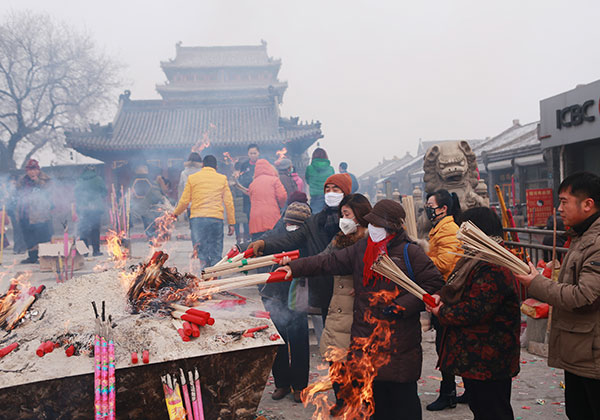 |
|
Buddhists wear masks to ward off heavy smog as they offer incense at the Daci Temple in downtown Baoding on Dec 25, a traditional day of prayer in the Chinese lunar calender. ZOU HONG/CHINA DAILY |
Production restrictions
For more than 10 years, Zhang Qiuhe, 48, has operated a plant that produces plastic goods, such as containers, in the Jingxiu district of Baoding. The four-week production delay has left him with a lengthy backlog of orders to fill.
The production process at Zhang's factory generates volatile organic compounds, which are major air pollutants, so the government ordered the factory to suspend production.
"The suspension could reduce our sales by about 9 million yuan ($1.4 million) because December is a busy production period," he said.
Most of his 80-plus employees have spent December at home, although a few have stayed to guard the premises.
"I still have to pay their regular salaries, because they are skilled technicians and workers, and that's important in this industry," Zhang said.
In addition to the current restrictions, the plant had already suspended work for about six weeks to limit air pollution in preparation for major national events, such as the military parade held in Beijing on Sept 3.
Many major and State-owned companies have also been ordered to adhere to the restrictions.
They are "playing leading roles in following the rules", said Zhao Jianying, deputy chief engineer at the coal-fired Datang Baoding Co-Generation Power Plant, which provides central heating services across an area of 20 square kilometers.
Under the restrictions, the plant is required to lower coal consumption, but it also needs to guarantee enough electricity to power urban heating services.
The company has cut the amount of coal it uses, and has reduced its generating capacity by 480,000 kilowatt hours per day, Zhao said.
The government has been monitoring the effects of the restrictions on industrial production, and plans to implement preferential tax and funding policies to help the companies most affected.
"We have treated air pollution as a priority and an urgent task in the government's work list," said Wang, of the environmental protection bureau, adding that the measures would affect economic growth, but it's a price worth paying because the cause is a worthy one.
More coal, more pollution
Baoding has conducted a thorough analysis of the sources of airborne pollution, the results of which will be published soon.
"Coal consumption has been the major contributor to the smog in our city," Wang said. Dust and exhaust emissions from vehicles are the next biggest offenders, he added.
The problem is directly linked to the city's low urbanization rate. Although the city has just 3 million residents, more than 8 million people live in the suburban areas, and coal is their only source of winter heating, according to the environmental bureau.
Coal-fired boilers in Baoding's rural households consume 10 million metric tons of coal every year, about half the city's total consumption and equal to that used by industry and other activities.
Though the suburban areas only account for half of the city's coal use, they are responsible for the majority of the pollutants emitted.
That's because many factories have installed equipment to reduce pollutants, cutting emissions by 80 percent, while rural households discharge pollutants directly into the atmosphere, Wang said.
In addition, fewer than 40 percent of urban residents in Baoding, the largest city in Hebei, have central heating, so the majority of urban residents also use coal to heat their homes, adding to the volume of pollutants discharged into the air, the environment bureau said.
